CBD and THC, the two most well-known cannabinoids contained in cannabis plants, have unique effects on the body and mind. Both THC and CBD are good for your health in different ways, but it's important to understand their differences if you're thinking about using cannabis.
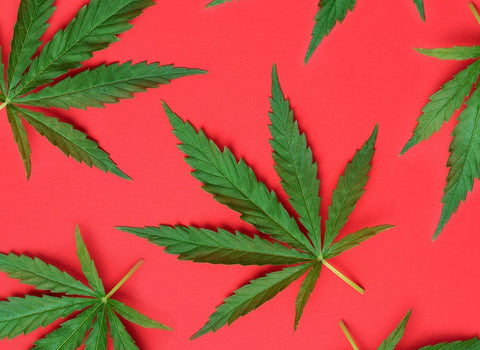
As the popularity of our Delta 9 edibles continues to grow, people are becoming more curious about the effects of CBD and THC. Let’s delve deeper into the effects of cannabidiol (CBD) and tetrahydrocannabinol (THC) and their purported health benefits.
CBD vs THC
THC and CBD are two major cannabinoids extracted from cannabis plants. They differ slightly in their chemical structures, which means they produce slightly different effects on our bodies.
Delta-9-tetrahydrocannabinol is known for the “high” that users experience, causing feelings of euphoria and relaxation. Often referred to as THC (Delta 9 is a form of THC), at higher doses it may cause mild psychoactive effects, like:
- Relaxation
- Euphoria
- Talkativeness
- Increased appetite
To find out more about tetrahydrocannabinol and its effects on your body, take a look at our in-depth THC guide.
Cannabidiol is another major compound found in both hemp and marijuana plants. Unlike its psychoactive cousin, CBD does not cause a high and generally produces relaxing and calming effects. Additionally, it is used to relieve pain, reduce inflammation, promote sleep, and much more.
For additional information, consult our guide on the differences between CBD and THC.
The Benefits of Microdosing
Microdosing cannabis has quickly gained prominence as a way of reaping the benefits of the plant without side effects. Microdosing allows users to get the benefits of THC while still feeling functional, making it a more practical option for individuals who need to remain productive throughout the day.
If this is your first encounter with low doses of cannabis, read more about the benefits of microdosing THC.
Let’s see how tetrahydrocannabinol and cannabidiol interact with our endocannabinoid system.
The Endocannabinoid System
The endocannabinoid system (ECS) is a complex network of receptors, enzymes, and natural chemicals called endocannabinoids that are found throughout the body. This system controls a wide range of bodily functions, such as feeling pain, mood, appetite, immune system function, and sleep.
Enzymes in the ECS break down endocannabinoids after they have served their purpose. This helps keep the system in balance and prevents it from being overstimulated.
Even though the ECS was first found through research on cannabis, it is now known to be an important part of how humans work. By learning more about this system, scientists have come up with new ways to treat a wide range of health problems, such as chronic pain, inflammation, anxiety, and depression.
ECS Receptors
The ECS is made up of two types of receptors: CB1 and CB2. The brain and nervous system have a lot of CB1 receptors, while the immune system and other organs have a lot of CB2 receptors. Endocannabinoids are made by the body, and when they attach to these receptors, they can help control many functions all over the body.
CB1 receptors are located predominantly in the brain and modulate its functions. Most CB2 receptors are in the gut and in immune cells. They control inflammation and our immune system. Despite the fact that there aren’t many CB2 receptors located in the brain, these endocannabinoids promote brain health and recovery from brain injury.
ECS Functions
Below are some of the functions and processes that the ECS influences:
- Inflammation
- Pain perception
- Mood and stress reaction
- Hunger and digestion
- Sleep and the 24-hour clock
- Inflammation and immune function
- Coordination and motor control
- Fertility and reproductive function
- Learning and memory
- Cardiovascular performance
- Bone formation and repair
- Emotional regulation
Since it controls so many different functions, the ECS plays a big role in treating and preventing a wide range of health problems. It does that by helping to keep the body in a state of homeostasis and making sure that all of its systems work together.
Cannabinoids and the ECS
THC and CBD bind differently with cannabinoid receptors to produce different effects.
Here's an overview of how each cannabinoid affects the ECS:
CBD
- CBD does not seem to bind significantly to CB1 or CB2 receptors, but instead interacts with these receptors indirectly, altering their activity. It antagonizes or down-regulates the cannabinoid receptors when THC is present in the system. In other words, when taken together, CBD regulates how THC interacts with CB1 and CB2 receptors.
- CBD has been shown to reduce pain and inflammation, and it may also be good for reducing nausea and promoting appetite.
- CBD may be an effective treatment for anxiety, depression, protecting brain cells from degeneration, and improving sleep. Our sleep-promoting CBD gummies might just be what you need if you struggle with insomnia or other sleep disorders.
THC
- Delta 9 THC produces its effects by interacting with CB1 receptors, which are mostly found in the brain and nervous system. This is what causes the "high" that is usually associated with using cannabis—though we recommend microdosing cannabis to get all the benefits, without the high.
- Activation of CB1 receptors has therapeutic benefits: it can relieve pain and inflammation, reduce hyperactivity and epileptic seizures, and treat nausea and vomiting.
- THC has the ability to activate CB2 receptors, which are present predominantly in the immune system and peripheral organs. The effects of THC on CB2 receptors are somewhat less understood. Some studies suggest that THC activates CB2 receptors to protect the cardiovascular system from hypoxia, a condition that involves low levels of oxygen in cardiac cells.
To learn more about cannabidiol, check out our in-depth guide to CBD.
While low doses of THC are useful, excessive THC doses can alter a person’s consciousness and influence their cognitive skills.
There’s no need to worry about excessive, cognition-impairing amounts of THC in our edibles. With only 10 milligrams per gummy, our pink lemonade Euphoria gummies can induce a mild state of euphoria without causing a high.
If you want to read more about the synergic interaction of THC and CBD, keep reading.
CBD and THC in the Entourage Effect
The entourage effect proposes that the medicinal effects of cannabis are improved when several cannabinoids and other chemicals are present together rather than when they are utilized alone. This concept is based on the premise that the many chemicals in cannabis work synergistically, increasing each other's effects and producing a more potent overall impact.
Some of the substances that may contribute to the entourage effect are as follows:
- Cannabinoids: the cannabis plant contains over 100 cannabinoids, each with its own set of effects on the body. THC and CBD are the most well-known, but others such as CBG, CBN, and THCV may also contribute to the entourage effect.
- Terpenes are aromatic chemicals present in a variety of plants, including cannabis. These chemicals may have therapeutic effects on their own, but they can also interact with cannabinoids to amplify their effects. Terpenes commonly discovered in cannabis include myrcene, limonene, and pinene.
- Flavonoids are a type of chemical present in a variety of fruits and vegetables, including cannabis. These chemicals may have anti-inflammatory and antioxidant properties, as well as contributing to the entourage effect.
The entourage effect implies that employing whole-plant cannabis products, including several cannabinoids, terpenes, and flavonoids may result in more substantial therapeutic effects than using isolated components alone. This concept has significant implications for the development of cannabis-based medicines as well as cannabis product regulation. By understanding how diverse components in cannabis work together, we may better adapt therapies to individual requirements and maximize the potential advantages of this versatile plant.
When you combine cannabidiol and Delta-9-tetrahydrocannabinol, CBD appears to reduce the likelihood of THC’s psychoactive effects, as well as tachycardia, increased anxiety, and sedation.
That’s right: CBD and THC do their best work when combined. Many of our edibles combine these two powerful cannabis compounds to create the entourage effect. Shop the greatest full spectrum CBD gummies to experience the synergistic properties of THC, CBD, and other minor cannabinoids.
You can find additional information on full spectrum CBD right here.
There’s no better way to combine the strengths of CBD and THC than with our Energy gummies. Infused with the exotic blood orange, these vegan edibles contain balanced doses of THC and CBD to bring out a sweet buzz and relax every last bit of you.
CBD vs THC: Analgesic Effects
Both CBD and THC have potent pain-relieving properties. An article on medical cannabis suggests that low doses of tetrahydrocannabinol (around 2.5 mg per serving) should be standard doses that provide adequate pain relief. Additionally, the best analgesic results are achieved by combining small amounts of THC with cannabidiol.
Low doses of THC seem to reduce pain, including neuropathic, arthritic, and cancer-related pain. Many people turn to microdosing THC and CBD to alleviate migraines and other types of chronic pain. A medically reviewed research paper found that cannabis has reduced opioid use by 64% and improved the overall quality of the patients’ lives.
2015 research confirms the ability of cannabinoids to relieve chronic pain. According to evidence from 28 randomized clinical trials of cannabinoids, cannabis could treat neuropathic pain and multiple sclerosis-related spasticity. THC and CBD may also alleviate pain from sciatica by disrupting signals between the pathways in the brain that process pain.
A 2020 study looked into the effects of CBD on joint pain and found that cannabidiol was able to reduce both pain and swelling. This could help with conditions like arthritis, joint pain, and multiple sclerosis.
Is THC or CBD Better for Pain Relief?
THC activates cannabinoid receptors—some of which are located in the nerve cells—altering the body’s perception of pain and reducing pain sensations. The mild euphoric feelings that low-dose THC provides may also play a role in our perception of pain.
On the other hand, CBD treats pain at its source, mainly by reducing inflammatory processes in the body. CBD seems to activate TRPV1 receptors that modulate pain signals. Following activation of TRPV1 receptors, cannabidiol inhibits their hypersensitivity to pain and increases analgesic activity.
What is better to treat pain, THC or CBD? We say, mix them! Our flavor-packed Bliss gummies contain 5 mg of THC and 5 mg of CBD, making them perfect for reducing pain levels and granting you a canna-blissful evening.
CBD vs THC: Anti-Inflammatory Effects
Chronic pain can often be a symptom of a chronic inflammatory condition. Small amounts of CBD and THC not only treat pain but are also powerful anti-inflammatory agents.
CBD and THC can lower the number of cytokines—chemicals made by our immune system that stimulate the production of inflammatory cells. By attacking cytokines and slowing down inflammation processes, cannabinoids attack and reduce inflammation.
An Annals of Gastroenterology article points out that, due to its powerful anti-inflammatory properties, cannabis is considered a potential therapeutic treatment for chronic inflammatory gastrointestinal conditions, such as IBD.
Is THC or CBD Better for Inflammation?
THC and CBD both have anti-inflammatory qualities. However, THC's psychoactivity may make it less desirable to some users. CBD, however, has a more modest effect on inflammation and lacks the psychoactive qualities of THC, making it a more attractive choice for people seeking relief from inflammation without the associated "high."
Microdosing THC can give anti-inflammatory benefits without making you high. Microdosing is the practice of taking small amounts of cannabis to get the therapeutic effect you want without getting any bad side effects. This can be a good way to get the powerful anti-inflammatory effects of THC without getting high.
A study on Cannabis sativa found that THC fights inflammation by activating CB2 cannabinoid receptors. It inhibits the production of cytokines and induces apoptosis and cell proliferation. In other words, THC does everything in its power to prevent inflammatory cells from generating, spreading, and thriving.
The great news is that CBD shares these powerful anti-inflammatory properties with THC, so their combination has many health benefits for people struggling with neuropathic pain, rheumatic diseases, joint pain, and chronic inflammatory conditions.
Shop our low-dose Delta 9 edibles, balanced with CBD, and experience the therapeutic effects of cannabis.
CBD vs THC: Effects on Cancer
Recent studies have revealed the efficacy of cannabis and cannabinoids in fighting cancer. Both THC and CBD are powerful anti-cancer agents that have been shown to modulate the growth, proliferation, and angiogenesis of tumor cells.
Proliferation refers to the spreading of cancer via tumor cell growth and cell division. Cancer cells seem to grow and spread more rapidly than normal cells, but cannabis appears to slow cancer proliferation for many types of carcinomas, including breast cancer, prostate cancer, and lung cancer.
Cannabidiol research found that cannabis has the ability to inhibit the creation of new blood vessels. This process, referred to as angiogenesis, allows cancer cells to feed on the patient’s blood, increase, and spread. One way CBD and THC prevent disease progression is by preventing angiogenesis in cancer patients.
Cannabinoids may also be efficient in managing chemotherapy-induced symptoms like pain, nausea and vomiting, weight loss, appetite loss, and insomnia. The combination of CBD and THC improves the overall quality of cancer patients’ lives.
You can find more information on CBD's and THC’s anti-cancer properties right here.
An equal ratio of cannabinoids, as found in our Euphoria gummies, can do wonders for chronic pain and getting rid of the nasty side effects of chemo.
CBD vs THC: Effects on Brain Health
THC and CBD have powerful therapeutic benefits for our brains. Researchers who study dementia think that small amounts of cannabis might help people with dementia, especially with symptoms like agitation and aggression.
An article in the European Journal of Clinical Investigation shows that giving older animals a low dose of THC makes a big difference in how well their brains work. THC showed biphasic effects on cognitive performance, meaning it can either help or harm cognition depending on the dose—which is why we always recommend microdosing cannabis.
- At low doses, THC seems to promote neurogenesis (creation of new neurons) and protect from neuroinflammation and cognitive damage. Similarly, small amounts of Delta 9 THC have been shown to restore memory and cognitive functions, while slowing neurodegenerative processes like Alzheimer’s and Parkinson’s disease.
- Higher amounts of THC typically impair short-term memory processing, like learning, cognition, and attention.
Low doses of THC in mice aged 12 months restored patterns of hippocampal gene transcription to resemble those of younger, healthy mice. It looks like THC signals CB1 receptors in older mice and treats age-related cognitive problems. Recent studies also indicate that microdosing THC and CBD could reverse brain aging.
CBD has some amazing neuroprotective effects as well. One review on neurogenesis discovered CBD’s ability to aid cell proliferation and promote the creation of new neurons.
Effects on Traumatic Brain Injury
Traumatic brain injuries (TBI) come with adverse effects like chronic pain, increased anxiety and depression, sleep disruption, and others. Low doses of CBD and THC can successfully treat pain, reduce inflammation, and improve the quality of life for people with traumatic brain injuries.
Is CBD or THC Better for Brain Health?
You don’t have to choose between CBD and THC to protect your brain and improve its functions. The THC and CBD in our top-quality Bliss gummies could help with symptoms of traumatic brain injuries, migraines, inflammation, and brain health. 25 mg of CBD will provide a sense of calm and reduce inflammation in the body, while only 5 mg of Delta 9 THC delivers a mild buzz and sweet pain relief.
CBD vs THC: Effects on Mental Health
Many cannabis users attest to the potent anti-anxiety properties of THC and CBD. The effects of cannabis on mental health, however, vary depending on the dose and the individual.
THC Helpful at Low Doses, Unhelpful at High Doses
THC at high doses has been shown to cause anxiety and paranoia in some people, especially those who are susceptible to its psychoactive effects. Research conducted at the University of Washington revealed that high amounts of THC could make anxiety, depression, and other mood disorders worse.
In contrast, microdosing THC seems to reduce the symptoms of anxiety disorders. Small amounts of THC can alleviate anxiety by activating CB1 receptors that regulate mood and stress.
CBD Good for Mental Health
CBD, on the other hand, has been shown to help with anxiety and depression at both high and low doses. This makes it a popular alternative for people with mental health problems. CBD has been shown to help regulate mood and lessen the symptoms of anxiety and depression. This makes it a promising treatment option for people with these conditions.
Microdosing THC and CBD can treat symptoms of:
- Anxiety (including social anxiety disorders, panic disorders, obsessive compulsive disorders, stage fright, and posttraumatic stress disorders)
- Depression
- Bipolar disorder
- Other types of mood disorders
Cannabinoids and Neurotransmitters
A study on cannabis has revealed that low doses of THC could treat depression. Other studies explore CBD’s potent antidepressant and anxiolytic effects and conclude that, similarly to THC, CBD has been linked to increased dopamine.
Dopamine, or the “happy hormone,” is responsible for feelings of pleasure, satisfaction, and motivation. It also affects a variety of physical functions and brain activities, like mood and sleep. Insufficient amounts of dopamine could lead to anxiety and depression.
Low levels of serotonin, another important “feel-good hormone," are linked to depression, mood disorders, and problems with the digestive tract. 2007 research found that low THC can effectively treat depression by increasing the activity in the serotonergic neurons (brain cells that regulate serotonin levels and function). Higher doses seem to deplete serotonin and amplify depression and psychotic symptoms.
Read more about the association between cannabis and increased serotonin.
Cannabinoids Improve Focus and Mental Clarity
Boosting levels of dopamine helps people suffering from depression and anxiety. But did you know that dopamine deficiency is also rooted in attention deficit hyperactivity disorder? By increasing dopamine, cannabis decreases symptoms associated with ADHD—lack of motivation and productivity, short attention spans, forgetfulness, and hyperactivity.
A 2012 study revealed the effects of cannabinoids on the dopamine system, linking low levels of dopamine with ADHD, increased anxiety, and mood disorders. CBD and THC are both effective methods for enhancing relaxation and improving focus and concentration. When dosed correctly, cannabis can stimulate creativity and lift the mood without causing psychoactive effects.
Is THC or CBD Better for Mental Health?
Whether you aim to boost levels of serotonin or dopamine, lower depression, or get rid of stage fright, low doses of THC and CBD seem to be the most efficient, natural, and safe way to do so. In order to experience the benefits of CBD and THC for mental health, we suggest microdosing edibles that contain both cannabinoids.
Our Relax Plus gummies might just be the top cannabis product for treating mental health conditions. Many users find that lower THC and higher CBD content produce the best results in boosting happy hormones and enhancing relaxation.
With an equal ratio of CBD and THC (10 mg of each per gummy), our hemp Euphoria gummies are a powerful dopamine booster. These vegan, delish edibles are perfect for low energy and motivation, serving uplifting experiences left and right.
CBD vs THC: Effects on Sleep
Cannabis is a natural sleep aid and a powerful relaxant. It is a healthy alternative to many prescribed medications, primarily because it doesn’t produce the side effects that sleeping pills typically do.
According to research, THC has been observed to reduce sleep onset latency and increase total sleep time. Low THC appears to help people fall asleep faster. In contrast, higher amounts are associated with disruption of rapid eye movement (REM) sleep. REM sleep is particularly important for healthy brain development, emotional processing, and memory.
An equally potent sleep aid, CBD can help insomniacs by regulating stress and synchronizing sleep patterns in the hypothalamus. In a study on the effects of cannabis, researchers discovered that “CBD could suppress the dysregulated cycle of stress hormones and overactivation and equalize the sleep and wake rhythm.”
While many cannabis users prefer CBD to THC because of its milder impact, the effects of cannabis are enhanced when THC and CBD are combined.
Some of our melatonin gummies for sleep contain no Delta 9 THC, so they are a great option for people who want to regulate their sleep patterns without consuming THC. CBD and THC together have great therapeutic benefits for sleep.
Our Sleep Plus gummies not only contain the powerful combination of THC and CBD but also the aromatic synergy of blackberry and lavender. Sweet dreams are made of this.
Product QUIZ
Need help deciding what product is best for you? Take our quiz, just three questions until your perfect match!
CBD vs THC: Effects on Appetite and Nausea
Increased appetite is one of the most well-known side effects of marijuana. Cannabis has the ability to relieve nausea and stimulate appetite, mainly by interacting with CB1 receptors. That's why THC and CBD are often used to treat eating disorders and relieve symptoms of nausea and vomiting associated with cancer treatments.
Researchers claim that the main culprit for increased appetite—the munchies—is THC. THC seems to make food taste better, tricking the brain into feelings of hunger. Low-THC products are less likely to give you the munchies, but a combination of low-dose THC and higher proportions of CBD might do the trick.
Our Energy gummies boast a higher CBD content (5 mg per gummy) and extra-low Delta 9 THC (2.5 mg). These edibles will provide a surge in energy and mood while actively working your appetite. They are perfect for individuals struggling with eating disorders or other appetite-reducing conditions.
Synthetic forms of cannabis (dronabinol) may also increase snacking behavior, especially in anorexic patients and people in treatment for HIV and AIDS. Dronabinol is a prescription medication approved by the Food and Drug Administration (FDA) used to treat weight loss symptoms and decreased appetite in people with HIV and AIDS.
Antiemetic Effects of THC and CBD
The Food and Drug Administration has also approved another synthetic cannabinoid, nabilone. Both nabilone and dronabinol are used to stimulate appetite in patients with wasting illnesses, and to treat symptoms of nausea and vomiting.
Nausea is a typical side effect of chemotherapy. Another double-blind, placebo-controlled study examined the efficacy of cannabis in treating chemotherapy-related nausea and discovered that THC and CBD in equal concentrations (and low amounts) can be effective anti-nausea treatments.
The researchers from the University of New Mexico claim that the effects of cannabinoids on nausea are immediate. The research was mainly focused on smoking cannabis, but the research team suggested that THC and CBD in any form of consumption could have similar beneficial properties for suppressing nausea and vomiting with a delayed effect.
(Our Delta 9 gummies take a bit longer to kick in compared to other methods of consumption. The effects of gummies also last longer than other types of consumption, particularly smoking and vaping.)
Is THC or CBD Better for Appetite and Nausea?
When you combine THC and CBD and put them in the most delicious Bliss edibles, you get an irresistible way to regulate appetite and fight off nausea. These honeydew-licious gummies will stimulate appetite and help you control feelings of nausea and vomiting. Release the munchies!
Side Effects of CBD vs THC
The risk of experiencing side effects with microdoses of THC and CBD is virtually nonexistent. Our edibles have low doses of THC for good effects only.
Side Effects of High THC
While THC has potential medicinal benefits, excessive THC consumption can result in unpleasant side effects, especially in people who are sensitive to its euphoric qualities. Depending on the dose and the person, these side effects can be mild to severe and can cause both physical and mental problems.
Anxiety and paranoia are two of the most typical negative effects of excessive THC usage. THC has been identified to activate specific receptors in the brain, which can trigger anxiety and paranoia in some people at high doses. Some possible negative effects of excessive THC use include:
- Coordination and motor abilities are impaired.
- Increased heart rate and blood pressure
- Mouth and throat dryness
- Red eyes
- Memory loss and cognitive deficiencies
- Delusions or hallucinations
- Paranoia
In extreme circumstances, excessive THC doses can cause cannabis hyperemesis syndrome, which is characterized by severe nausea, vomiting, and stomach pain.
It should be noted that the intensity and incidence of these side effects can vary based on the individual and the amount of THC consumed. Individuals who are more sensitive to THC's euphoric effects may be more susceptible to suffering these side effects, whereas experienced users may be able to withstand higher amounts without unpleasant effects.
Dangers of Smoking Cannabis
Cannabis has very few side effects, especially at low doses. Smoking cannabis, however, exposes your body to carcinogens and other harmful chemicals, which is why we always recommend using edibles.
The Mayo Clinic warns that smoking cannabis can impair attention, judgment, and coordination. Excessive use of medical marijuana may worsen psychotic symptoms in people with mental disorders.
Instead of smoking cannabis, turn to delicious low-dose edibles, such as our Relax Plus gummies. At only 5 mg of Delta 9 THC in each gummy, it is virtually impossible to impair cognition and coordination or worsen the symptoms of mental disorders.
Side Effects of CBD
CBD's side effects are generally mild and harmless. Potential side effects of CBD might be:
- Fatigue
- Decrease in blood pressure
- Dizziness
- Diarrhea
- Changes in appetite
- Upset stomach, with nausea and vomiting
According to experts at the Verywell Mind, CBD might interfere with prescribed medications. A clinical trial study concluded that cannabidiol could inhibit certain drug metabolizing enzymes (cytochrome P450). If you’re on medication, consult with a healthcare professional before starting with CBD.
Legality of CBD and THC
Delta 9 THC is federally legal if derived from hemp (not marijuana) and if the product contains no more than 0.3% of THC by dry weight. These conditions were stipulated by the 2018 Farm Bill, a piece of legislation that legally separated hemp from marijuana, and legalized hemp and hemp-derived products.
This makes all our Delta 9 edibles legal at the federal level, including products with cannabidiol.
The same Farm Bill rules apply for CBD. Marijuana-derived CBD is governed by the same laws as THC derived from marijuana.
Despite federal legality, each state individually decides on hemp-derived products' legality within their state borders. Find more information on this topic in our guide to the state-by-state legality of Delta 9.
There is no better way to microdose cannabis than with our amazing edibles. Are you looking to buy some high-quality, top-notch flavored Delta 9 gummies? Read all the scoop on where to buy Delta 9 gummies in the US right here.
FAQ about CBD vs THC
No, you can’t get addicted to CBD, even at higher doses. While THC can be addictive when taken too often in high doses, CBD does not produce a high and does not have psychoactive effects that could result in dependency.
Research shows that CBD can be successfully used to help mitigate other forms of addictive behaviors, like those caused by opioids and alcohol.
Shop our phenomenal CBD gummies and experience the ultimate benefits of microdosing.
Higher proportions of CBD and low doses of THC seem to provide the perfect ratio for people struggling with anxiety. CBD brings relaxation and ease, while THC provides a dopamine boost and a mild euphoric buzz.
Our CBD Sleep Plus gummies, with 25 mg of CBD and only 2 mg of THC, work well at reducing anxiety and improving sleep patterns. These custom formulated blends of full spectrum hemp extract also contain low amounts of melatonin, a powerful sleep aid.
Read more about melatonin and its benefits for regulating sleep.
While cannabis hasn’t been proven to cure irritable bowel syndrome (IBS), low doses of THC and CBD might be able to treat the symptoms, such as:
- Chronic pain
- Inflammation of the gastrointestinal tract
- Nausea and vomiting
- Bloating
- Stress and anxiety
- Weight loss and loss of appetite
Check out more ways cannabis edibles could help irritable bowel syndrome.
Researchers at the University of Florida came to the conclusion that cannabis smoke improves working memory accuracy—for female rats but not males. Their research demonstrated that doses of THC administered to male rats in the study didn’t seem to affect them at all, but in female rats “exposure to cannabis smoke significantly increased choice accuracy.”
Acute cannabis consumption seems to enhance working memory performance in a delayed response task in rats. More research involving human subjects is needed, as is more research on marijuana and driving. However, there are clear indications that low THC doses do not cause cannabis intoxication or lead to drug-impaired driving.
Top Sellers
New? Start with our Ultimate Sampler!

THC: 10 mg | CBC: 10 mg | CBD: 10 mg | CBG: 5 mg | CBN 5mg
Resources
Delta-9-tetrahydrocannabinol protects cardiac cells from hypoxia via CB2 receptor activation and nitric oxide production - PubMed. (2006, February 1). PubMed. https://doi.org/10.1007/s11010-006-2346-y
Bains, S., & Mukhdomi, T. (2022, October 3). Medicinal Cannabis For Treatment Of Chronic Pain - StatPearls - NCBI Bookshelf. Medicinal Cannabis for Treatment of Chronic Pain - StatPearls - NCBI Bookshelf. https://www.ncbi.nlm.nih.gov/books/NBK574562/
Boehnke, K. F., Litinas, E., & Clauw, D. J. (2016, June 1). Medical Cannabis Use Is Associated With Decreased Opiate Medication Use in a Retrospective Cross-Sectional Survey of Patients With Chronic Pain. The Journal of Pain. https://doi.org/10.1016/j.jpain.2016.03.002
Medical Marijuana for Treatment of Chronic Pain and Other Medical and Psychiatric Problems: A Clinical Review - PubMed. (2015, June 1). PubMed. https://doi.org/10.1001/jama.2015.6199
CBD for the treatment of pain: What is the evidence? (2020, July 4). CBD For the Treatment of Pain: What Is the Evidence? - ScienceDirect. https://doi.org/10.1016/j.japh.2020.06.009
Anil, S. M., Peeri, H., & Koltai, H. (2022, April 8). Medical Cannabis Activity Against Inflammation: Active Compounds and Modes of Action. Frontiers. https://doi.org/10.3389/fphar.2022.908198
Perisetti, A., Rimu, A. H., Khan, S. A., Bansal, P., & Goyal, H. (2020, February 12). Role of cannabis in inflammatory bowel diseases. PubMed Central (PMC). https://doi.org/10.20524/aog.2020.0452
Kopustinskiene, D. M., Masteikova, R., Lazauskas, R., & Bernatoniene, J. (2022, March 29). Cannabis sativa L. Bioactive Compounds and Their Protective Role in Oxidative Stress and Inflammation. MDPI. https://doi.org/10.3390/antiox11040660
Laezza, C., Pagano, C., Navarra, G., Pastorino, O., Proto, M. C., Fiore, D., Piscopo, C., Gazzerro, P., & Bifulco, M. (2020, January 23). The Endocannabinoid System: A Target for Cancer Treatment. PubMed Central (PMC). https://doi.org/10.3390/ijms21030747
Massi, P., Solinas, M., Cinquina, V., & Parolaro, D. (2012, April 17). Cannabidiol as potential anticancer drug. PubMed Central (PMC). https://doi.org/10.1111/j.1365-2125.2012.04298.x
Calabrese, E. J., & Rubio‐Casillas, A. (2018, April 2). Biphasic effects of THC in memory and cognition. European Journal of Clinical Investigation, 48(5). https://doi.org/10.1111/eci.12920
Bilkei-Gorzo, A., Albayram, O., Draffehn, A., Michel, K., Piyanova, A., Oppenheimer, H., Dvir-Ginzberg, M., Rácz, I., Ulas, T., Imbeault, S., Bab, I., Schultze, J. L., & Zimmer, A. (2017, May 8). A chronic low dose of Δ9-tetrahydrocannabinol (THC) restores cognitive function in old mice - Nature Medicine. Nature. https://doi.org/10.1038/nm.4311
Valeri, A., & Mazzon, E. (2021, October 19). Cannabinoids and Neurogenesis: The Promised Solution for Neurodegeneration? PubMed Central (PMC). https://doi.org/10.3390/molecules26206313
Stoner A. Susan, Effects of Marijuana on Mental Health: Anxiety Disorders. Alcohol & Drug Abuse Institute, University of Washington, June 2017. http://adai.uw.edu/pubs/pdf/2017mjanxiety.pdf
Antidepressant-like effect of delta9-tetrahydrocannabinol and other cannabinoids isolated from Cannabis sativa L - PubMed. (2010, June 1). PubMed. https://doi.org/10.1016/j.pbb.2010.03.004
Study: Cannabis a double-edged sword. (2007, October 23). Newsroom. https://www.mcgill.ca/newsroom/channels/news/study-cannabis-double-edged-sword-27677
Oleson, E. B., & Cheer, J. F. (n.d.). A Brain on Cannabinoids: The Role of Dopamine Release in Reward Seeking. PubMed Central (PMC). https://doi.org/10.1101/cshperspect.a012229
Vaillancourt, R., Gallagher, S., Cameron, J. D., & Dhalla, R. (2022, April 15). Cannabis use in patients with insomnia and sleep disorders: Retrospective chart review. Canadian Pharmacists Journal / Revue Des Pharmaciens Du Canada, 155(3), 175–180. https://doi.org/10.1177/17151635221089617
CBD For Sleep: Benefits, Risks And More. (2022, June 3). Forbes Health. https://www.forbes.com/health/body/cbd-for-sleep/
Koch, M., Varela, L., Kim, J. G., Kim, J. D., Hernandez, F., Simonds, S. E., Castorena, C. M., Vianna, C. R., Elmquist, J. K., Morozov, Y. M., Rakic, P., Bechmann, I., Cowley, M. A., Szigeti-Buck, K., Dietrich, M. O., Gao, X. B., Diano, S., & Horvath, T. L. (2015, February 18). Hypothalamic POMC neurons promote cannabinoid-induced feeding. PubMed Central (PMC). https://doi.org/10.1038/nature14260
Andries, A., Frystyk, J., Flyvbjerg, A., & Støving, R. K. (2013, September 14). Dronabinol in severe, enduring anorexia nervosa: A randomized controlled trial. International Journal of Eating Disorders, 47(1), 18–23. https://doi.org/10.1002/eat.22173
(2018, September). Oral cannabinoid-rich THC/CBD cannabis extract for secondary prevention of chemotherapy-induced nausea and vomiting: a study protocol for a pilot and definitive randomised double-blind placebo-controlled trial (CannabisCINV). https://bmjopen.bmj.com/content/bmjopen/8/9/e020745.full.pdf
Cannabis offers immediate relief from symptoms of nausea, but product use matters. (2021, May 30). UNM Newsroom. http://news.unm.edu/news/cannabis-offers-mmediate-relief-from-symptoms-of-nausea-but-product-use-matters
Marijuana. (2020, November 18). Mayo Clinic. https://www.mayoclinic.org/drugs-supplements-marijuana/art-20364974
Interactions Between Cannabinoids and Cytochrome P450-Metabolized Drugs - Full Text View - ClinicalTrials.gov. (n.d.). Interactions Between Cannabinoids and Cytochrome P450-Metabolized Drugs - Full Text View - ClinicalTrials.gov. https://clinicaltrials.gov/ct2/show/NCT04201197
Prud’homme, M., Cata, R., & Jutras-Aswad, D. (2015, January). Cannabidiol as an Intervention for Addictive Behaviors: A Systematic Review of the Evidence. Substance Abuse: Research and Treatment, 9, SART.S25081. https://doi.org/10.4137/sart.s25081
Enhancing effects of acute exposure to cannabis smoke on working memory performance. (2018, December 3). Enhancing Effects of Acute Exposure to Cannabis Smoke on Working Memory Performance - ScienceDirect. https://doi.org/10.1016/j.nlm.2018.12.001
nama CBD FDA & Legal Disclaimer
This article is for informational purposes only, and does not constitute medical advice. Our products are not intended to diagnose, treat, cure, or prevent any disease. They are not a replacement for prescription medications and have not been evaluated by the Food and Drug Administration (FDA).
The information provided on this website does not, and is not intended to, constitute legal advice or any statements of the status of any laws. Any information, content, and materials available on this site are for general informational purposes only, and are not intended to be relied upon for any purpose.
Readers of this website should contact their attorney to obtain advice with respect to any particular legal matter including decisions on what products are, or are not, legal to sell, possess, or consume. No reader, user, or browser of this site should act or refrain from acting on the basis of information on this site without first seeking legal advice from their own counsel in the relevant jurisdiction.
Only your individual attorney can provide assurances that the information contained herein – and your interpretation of it – is applicable or accurate for your particular situation. Use of, and access to, this website or any of the links or resources contained within the site do not create an attorney-client relationship between the reader, user, or browser, and website authors, contributors, contributing law firms, or committee members and their respective employers.
More From the nama Family
Small batch edibles crafted for different times of the day and experiences.
About
Learn
Join us on this journey

© Copyright 2026 nama Products LLC. All Rights Reserved.
†These statements have not been evaluated by the Food and Drug Administration. These products are not intended to diagnose, treat, cure or prevent any disease. All information presented here is not meant as a substitute for or alternative to information from health care practitioners. Please consult your health care professional about potential interactions or other possible complications before using any product.
††The information provided on this website does not, and is not intended to, constitute legal advice or any statements of the status of any laws. Any information, content, and materials available on this site are for general entertainment purposes only, and are not intended to be relied upon for any purpose.
nama: The only source for Buzz Drops™

By clicking ‘Yes,’ you agree to our
Terms & Conditions and Privacy Policy
123 John Doe Street
Your Town, YT 12345
Store Hours
Sun: Closed
Mon-Fri: 9:00 - 17:00
Sat: 10:00 - 13:00
What to expect at pickup
Closed
Closing at 5pm
Closing at 5pm
Closing at 5pm
Closing at 5pm
Closing at 5pm
Closing at 1pm





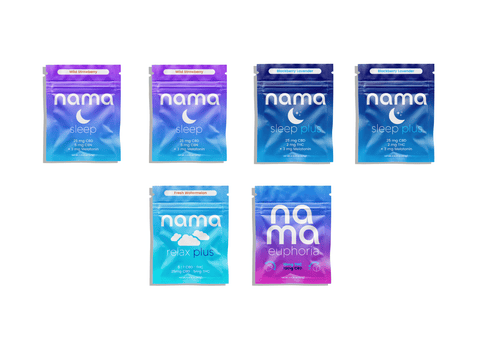
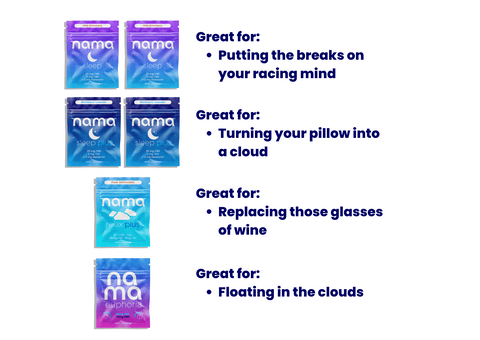
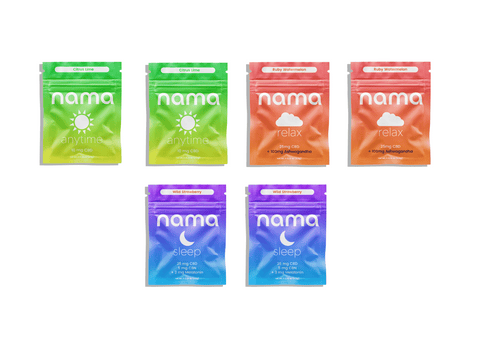
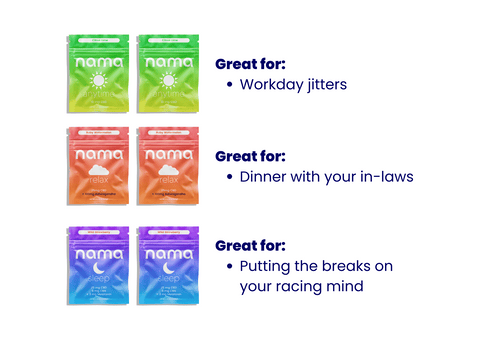
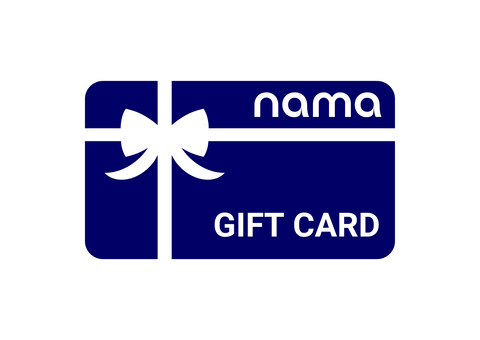







![Buzz Packs™ [THC and CBD Powder Drink Mix]](http://www.namacbd.com/cdn/shop/files/nama_buzz_packs_thc_drink_pack_white_background.png?v=1769586244&width=480)
![Buzz Packs™ [THC and CBD Powder Drink Mix]](http://www.namacbd.com/cdn/shop/files/Buzz_Packs_Label.png?v=1769586244&width=480)
![Buzz Drops™ [THC Drink Drops]](http://www.namacbd.com/cdn/shop/files/nama_thc_buzz_drops.png?v=1711412866&width=480)
![Buzz Drops™ [THC Drink Drops]](http://www.namacbd.com/cdn/shop/files/buzz-drop-wine-comparison.png?v=1736882023&width=480)
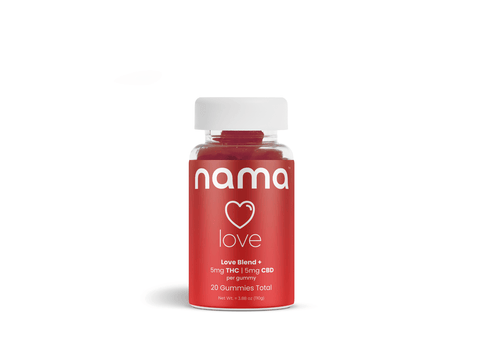
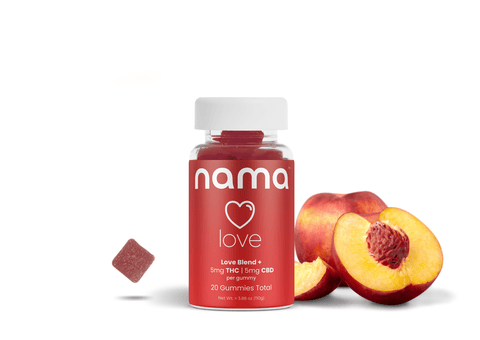

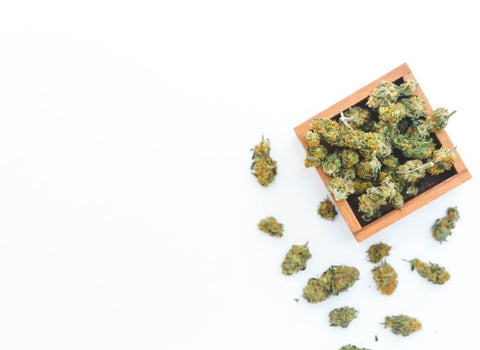

Comments (0)
There are no comments for this article. Be the first one to leave a message!